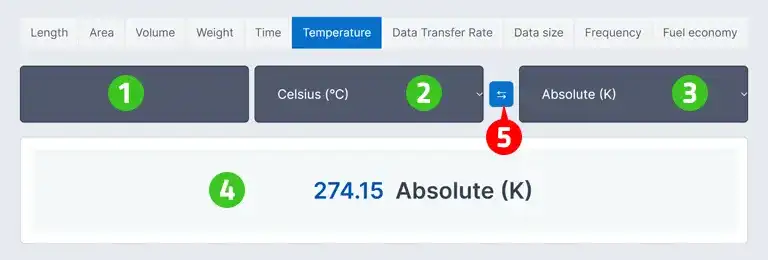Table Of Contents
Introduction to Temperature Unit Converter
A temperature unit converter is a tool for converting between different temperature units. Common temperature units include Celsius (°C), Fahrenheit (°F), Kelvin (K), and Rankine (°R). This tool is useful not only in daily life but also in scientific experiments, engineering, meteorology, and various other fields.
Temperature Unit Converter Terminology
Celsius Temperature (°C)
- Definition: The Celsius temperature scale was proposed by Swedish astronomer Anders Celsius.
- Reference Point: Sets the freezing point of water at 0°C and the boiling point at 100°C, divided into 100 equal parts.
- Usage: Daily life, meteorology, and most scientific fields.
Fahrenheit Temperature (°F)
- Definition: The Fahrenheit temperature scale was proposed by German physicist Gabriel Daniel Fahrenheit.
- Reference Point: Sets the freezing point of water at 32°F and the boiling point at 212°F, divided into 180 equal parts.
- Usage: Mainly used in the United States and some Commonwealth countries
Absolute Temperature (K)
- Definition: Kelvin is the SI unit for measuring absolute temperature, based on absolute zero (0 K) where all thermal motion of matter stops.
- Reference Point: Absolute zero is approximately -273.15°C.
- Usage: Scientific and engineering fields, especially thermodynamics, physics, and astrophysics.
Rankine Temperature (°R)
- Definition: The Rankine temperature scale was proposed by Scottish engineer and physicist William John Macquorn Rankine.
- Reference Point: Like Fahrenheit, 0°R corresponds to absolute zero and has the same interval as Fahrenheit.
- Usage: Mainly used in the United States, especially in thermodynamics and engineering.
Temperature Unit Conversion Formulas
Celsius (°C), Fahrenheit (°F), Kelvin (K), and Rankine (°R) each have their historical background and uses, and are appropriately used in specific fields. Understanding the conversion formulas between each unit allows for accurate temperature conversion.
How to Use the Temperature Unit Converter
When you first open the page, you’ll see that the base unit is set to 1 Celsius (°C) with values for all units displayed. If you need values for other temperature units, follow these steps:
- Enter the temperature value you want to convert in the first blank space.
- Select the temperature unit from the dropdown menu in step 2.
- Choose the target temperature unit you want to convert to in step 3.
- Check the result value in step 4.
- Press button 5 to switch the unit values for calculation.
Frequently Asked Questions
What does the Temperature Unit Converter do?
The Temperature Unit Converter is a tool that easily converts between various temperature units such as Celsius (°C), Fahrenheit (°F), and Kelvin (K). It displays real-time conversions of user-input temperature values to other units.
What units are supported?
This site allows you to convert between Celsius (°C), Fahrenheit (°F), Kelvin (K), and Rankine (°R) temperature units.
Are there any usage restrictions?
The Temperature Unit Converter on this page is provided free of charge and can be used without any restrictions.
Can it be used on mobile devices?
Yes, it works very well on smartphones, just like on a PC.
How accurate is it?
It shows high accuracy as it uses verified formulas.
How do I use the Temperature Unit Converter?
On the converter screen, select the current temperature value and unit. If you want to convert to another unit, select that unit, and the converted value will be displayed in real-time. You can also directly input temperature values as needed.
What’s the difference between Celsius, Fahrenheit, and Kelvin temperature units?
Celsius (°C): Defines the freezing point of water as 0 degrees and the boiling point as 100 degrees.
Fahrenheit (°F): Defines the freezing point of water as 32 degrees and the boiling point as 212 degrees.
Kelvin (K): An absolute temperature unit that sets absolute zero as 0 degrees.
What are the advantages of using the Temperature Unit Converter?
It saves time and effort by showing accurate real-time conversions between temperature units without the need for manual calculations, helping to prevent errors.



